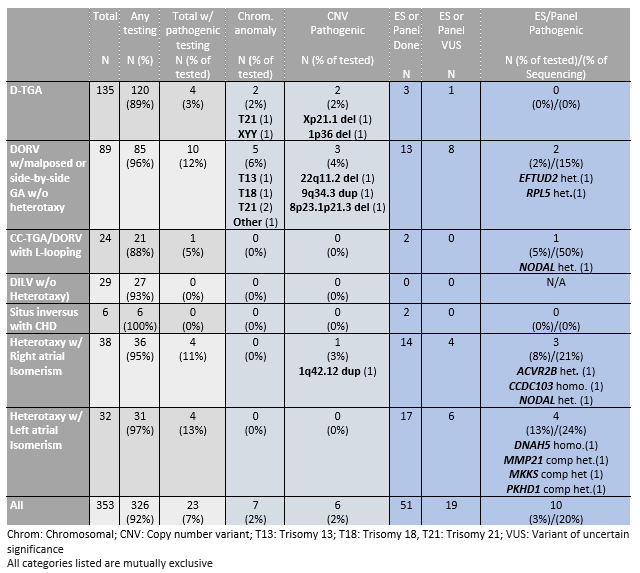Cardiology
Category: Abstract Submission
Cardiology I
177 - Yield of Systematic Inpatient Genetic Testing of Neonates with Conotruncal and Laterality Heart Defects
Friday, April 22, 2022
6:15 PM - 8:45 PM US MT
Poster Number: 177
Publication Number: 177.101
Publication Number: 177.101
Ahmed Almaazmi, Baylor College of Medicine, Houston, TX, United States; Taylor Beecroft, Baylor College of Medicine, Houston, TX, United States; Seema R. Lalani, Baylor College of Medicine, Houston, TX, United States; Shaine A. Morris, Baylor College of Medicine, Houston, TX, United States

Ahmed Almaazmi, MB BCh BAO
Clinical Postdoctorate Fellow
Baylor College of Medicine
Houston, Texas, United States
Presenting Author(s)
Background: Many studies have demonstrated a high yield of genetic testing in congenital heart disease (CHD); however, to date, testing in most centers is not systematic and performed in a clinical setting.
Objective: To describe the diagnostic yield of systematic genetic testing by lesion of neonates with conotruncal and/or laterality CHD.
Design/Methods: We performed a retrospective cohort study of infants with conotruncal and/or laterality CHD admitted to either the neonatal or cardiac intensive care units < 28 days of age between January 2012 - December 2019. During this time, institutional recommendations were for a chromosomal microarray (CMA) for all children with CHD if a clear diagnosis of aneuploidy was not present. If negative, gene panel or exome sequencing was considered for infants with dysmorphic features, extracardiac defects (ECA), or a family history of CHD. Results of prenatal and postnatal genetic testing were reported by CHD lesion, and by testing modality.
Results: A total of 693 subjects met inclusion criteria, with 51% of those with laterality CHD. A total of 94% (n=651) underwent at least one form of genetic testing, with 96% of those having had a CMA prenatally or postnatally. Overall yield of systematic genetic testing was 18% (119/651) for a pathogenic diagnostic finding, with 30% being in conotruncal CHD, and 7% being in those with laterality CHD. Chromosomal anomalies and copy number variants were much more common in conotruncal anomalies 26% than in laterality defects 4%. Sixteen percent of those with conotruncal disease and 14% of those with laterality defects underwent gene sequencing, with the pathogenic diagnostic yield among those tested being 21% and 20% respectively.Conclusion(s): Systemic genetic testing of neonates with CHD consisting predominantly of CMA results in a high diagnostic rate for pathogenic genetic conditions for those with conotruncal defects. Given the high yield of gene sequencing in the minority of subjects tested with both conotruncal and laterality CHD, increased use of sequencing when CMA is negative is likely to provide even higher diagnostic rates.
Table 1: Yield of genetic testing of neonates with conotruncal heart defects..png) Table 1: Yield of genetic testing of neonates with conotruncal heart defects.
Table 1: Yield of genetic testing of neonates with conotruncal heart defects.
Table 2: Yield of genetic testing of neonates with laterality defects. Table 2: Yield of genetic testing of neonates with laterality defects.
Table 2: Yield of genetic testing of neonates with laterality defects.
Objective: To describe the diagnostic yield of systematic genetic testing by lesion of neonates with conotruncal and/or laterality CHD.
Design/Methods: We performed a retrospective cohort study of infants with conotruncal and/or laterality CHD admitted to either the neonatal or cardiac intensive care units < 28 days of age between January 2012 - December 2019. During this time, institutional recommendations were for a chromosomal microarray (CMA) for all children with CHD if a clear diagnosis of aneuploidy was not present. If negative, gene panel or exome sequencing was considered for infants with dysmorphic features, extracardiac defects (ECA), or a family history of CHD. Results of prenatal and postnatal genetic testing were reported by CHD lesion, and by testing modality.
Results: A total of 693 subjects met inclusion criteria, with 51% of those with laterality CHD. A total of 94% (n=651) underwent at least one form of genetic testing, with 96% of those having had a CMA prenatally or postnatally. Overall yield of systematic genetic testing was 18% (119/651) for a pathogenic diagnostic finding, with 30% being in conotruncal CHD, and 7% being in those with laterality CHD. Chromosomal anomalies and copy number variants were much more common in conotruncal anomalies 26% than in laterality defects 4%. Sixteen percent of those with conotruncal disease and 14% of those with laterality defects underwent gene sequencing, with the pathogenic diagnostic yield among those tested being 21% and 20% respectively.Conclusion(s): Systemic genetic testing of neonates with CHD consisting predominantly of CMA results in a high diagnostic rate for pathogenic genetic conditions for those with conotruncal defects. Given the high yield of gene sequencing in the minority of subjects tested with both conotruncal and laterality CHD, increased use of sequencing when CMA is negative is likely to provide even higher diagnostic rates.
Table 1: Yield of genetic testing of neonates with conotruncal heart defects.
.png) Table 1: Yield of genetic testing of neonates with conotruncal heart defects.
Table 1: Yield of genetic testing of neonates with conotruncal heart defects.Table 2: Yield of genetic testing of neonates with laterality defects.
 Table 2: Yield of genetic testing of neonates with laterality defects.
Table 2: Yield of genetic testing of neonates with laterality defects.